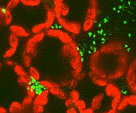Plant Pathology, Department of

Department of Plant Pathology: Faculty Publications
Document Type
Article
Date of this Version
2004
Citation
MPMI Vol. 17, No. 4, 2004, pp. 404–413. Publication no. M-2004-0116-01R.
Abstract
Sclerotial development is fundamental to the disease cycle of the omnivorous broad host range fungal phytopathogen Sclerotinia sclerotiorum. We have isolated a highly conserved homolog of ERK-type mitogen-activated protein kinases (MAPKs) from S. sclerotiorum (Smk1) and have demonstrated that Smk1 is required for sclerotial development. The smk1 transcription and MAPK enzyme activity are induced dramatically during sclerotiogenesis, especially during the production of sclerotial initials. When PD98059 (a specific inhibitor of the activation of MAPK by MAPK kinase) was applied to differentiating cultures or when antisense expression of smk1 was induced, sclerotial maturation was impaired. The smk1 transcript levels were highest under acidic pH conditions, suggesting that Smk1 regulates sclerotial development via a pH-dependent signaling pathway, involving the accumulation of oxalic acid, a previously identified pathogenicity factor that functions at least in part by reducing pH. Addition of cyclic AMP (cAMP) inhibited smk1 transcription, MAPK activation, and sclerotial development. Thus, S. sclerotiorum can coordinate environmental signals (such as pH) to trigger a signaling pathway mediated by Smk1 to induce sclerotia formation, and this pathway is negatively regulated by cAMP.


Comments
Copyright © 2004 The American Phytopathological Society. Used by permission.